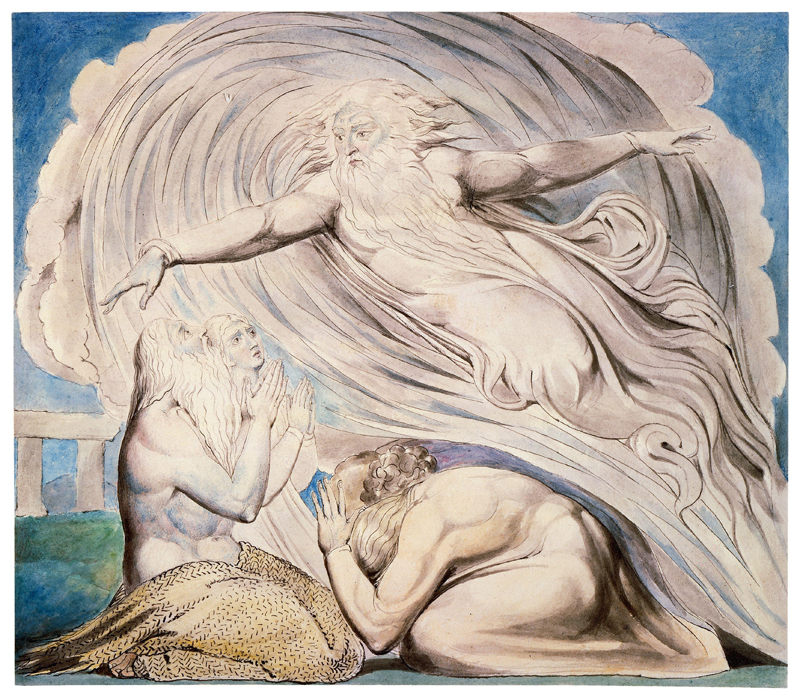Job wanted his day in court because, if, as his friends alleged, his own sins caused him to suffer, then he wanted to see the evidence. Since Job wouldn’t admit to anything, one of his so-called friends, a man named Elihu, decided to take a different approach. Rather than blame Job, Elihu told Job to quit questioning God because God is too busy and important to bother with Job and his problems. After all, Job should consider the “wondrous works of God.” Just look around at creation because when you take in the grandeur of creation, you’ll realize how small you really are in the grand scheme of things. (Job 37:14, 23).
I get Elihu’s point about the wonder of the creation. Cheryl and I recently visited the Upper Peninsula. We took a boat trip out along the Pictured Rocks National Lakeshore and took in Tahquamenon Falls, among other points of interest. Scenes like this produce a sense of awe at the wondrous works of God and you realize how big the universe is and how small we really are. Even the earth, when seen from space is a rather small place. So why would God bother with Job?
Job never got to respond to Elihu’s more sophisticated response to his complaints because God showed up ready and willing to take on Job’s questions. Apparently, God wasn’t too busy to talk with Job. But God didn’t enter the conversation gently. No, God appeared in a whirlwind.
When we lived in Kansas, we learned that when you see a funnel cloud forming, you should immediately seek shelter. But that’s not what Job does. He just stands there stunned. It might be the whirlwind or the fact that God showed up, but for the first time Job is speechless. Although God shows up God doesn’t answer Job’s questions. Instead, God picks up on Elihu’s response and lays on Job a barrage of questions that runs from chapter 38 into chapter 40. When this line of questioning comes to a close, God asks Job: “Shall a faultfinder contend with the Almighty? Anyone who argues with God must respond” (Job 40:1). Now, if you were Job, and you had been chastened by a barrage of questions, how would you respond?
Before you answer that question, consider for a moment the way the author of Job describes God. Perhaps, like me, you’re not sure you like the God who appears in Job, but maybe that’s the point of the book. It forces us to wrestle with the question “who is God” in the context of what appears to be a rather broken world. It celebrates God’s creative acts, and yet God seems capricious. So, what are your expectations of God?
If, like Job, you had the opportunity to speak to God face-to-face, what would you say? How would you act? I know we speak to God in our prayers, but God remains unseen. What if you could see God and hear God in the way described here in Job?
As you ponder that question, think about how you would react if the President of the United States unexpectedly showed up here at church. I know we all have questions for our Presidents. We may even shout at them on the TV. But standing face-to-face with the President could be a bit more intimidating than facing down the TV image. So, would you keep quiet or run up and shower the President with a barrage of questions?
While I haven’t had the opportunity to speak with a President or a Governor, I’ve had opportunities to speak with people I greatly admire. So, once upon a time, I was at a conference where Jürgen Moltmann was the featured speaker. Moltmann is one of the great theologians of the post-World War II era and I’ve read most of his books. I would love to chat with him, even if only for a few minutes, about theology. I had the opportunity to do this. You see, I was going down to dinner when I ran into him sitting on a bench in the hallway. Here was my chance to talk with one of my heroes, but all I could get out was “hi, how are you this evening?” When the elevator opened, I entered, and my chance to talk theology with him was gone. In other words, I froze!
Of course, in this scene, God didn’t give Job much of a chance to ask his questions. God just appeared out of nowhere in the form of a whirlwind and fired a long series of questions at Job that could easily be summarized as: “Who are you to ask questions of me, the creator of the universe?” So, pull up your pants, tighten your belt and give me your best answer! Answer me this: “Where were you when I laid the foundations of the earth?” (Job 38:4) When we read the Book of Job, it’s easy to feel sorry for Job and dislike God. This God seems capricious and something of a bully. After all, doesn’t God give the Adversary permission to bring disaster on Job and his family? Is this the kind of God who warrants our worship? Yes, the story of Job is rather unsettling. Maybe that’s the way it’s intended to be read. It forces us to think carefully about how we view God.
When God appears to Job in chapter 38, God asks Job if he has sufficient knowledge and wisdom to debate the big questions of life with God. God asks Job: Do you know what I know? Can you see the big picture? Were you there when I created this world you inhabit? In fact, who gave you the wisdom you possess (Job 38:36)? Job can’t answer God’s questions so when God finishes prosecuting him, all Job can do is answer: “See, I am of small account; what shall I answer you?” (Job 40:4).
I’m assuming most of us gathered here this morning believe in God. I also imagine we bring to church our own ideas about God’s identity. We may bring questions and concerns with us. In fact, we may bring our doubts with us to church. That’s because the world around us doesn’t always make sense. It’s one thing to stand in awe before one of God’s grand creations and give thanks. It’s another thing to watch the news and hear about the chaos in Haiti or Afghanistan or even our own country and wonder why things are the way they are. When we face the dark side of life, we may wonder where God is in all of this. That’s a good question to ponder.
When we read the Bible in search of answers, we need to remember that the authors often use metaphor and analogy to describe God. These metaphors and analogies have their limits. So, while the book of Job raises important questions about God, I wouldn’t recommend looking to Job for an accurate picture of God’s identity. But, it does force us to wrestle with difficult questions. Like we saw last week, one of those questions is: why do bad things happen to good people, and is God responsible?
Perhaps the answer will come in the form of a question—or really a barrage of questions. It could it be that we simply don’t have sufficient wisdom and understanding to find a fully satisfying answer but that doesn’t mean we should stop asking our questions of God. After all, God tells Job to pull up his pants, tighten his belt, and give it his best shot. Could it be that answers to our questions will come as we continue the conversation with God and with each other?
As we continue the conversation with God and with each other about the way things work in the world, it’s worth remembering Paul’s words to the Corinthians. He told them to put away childish things, act like an adult, and remember that “for now we see in a mirror, dimly,” but there will come a time when “we will see face to face.” For now, we “know only in part;” but the time will come when we will “know fully,” even as we are “fully known.” In the meantime, Paul says, “faith, hope, and love abide, these three; and the greatest of these is love” (1 Cor. 13:11-13). Job invites us to ask our questions even if not all the answers are available to us. After all, we’re not God. In the meantime we look at the world through a dim mirror, carrying our questions with us. But, as Paul lets us know, in the meantime, until we see God face to face, let us live in faith, hope, and love.
Preached by:
Dr. Robert D. Cornwall, Acting Supply Pastor
First Presbyterian Church
October 24, 2021
Image attribution: Blake, William, 1757-1827. Lord Answers Job Out of the Whirlwind, from Art in the Christian Tradition, a project of the Vanderbilt Divinity Library, Nashville, TN. https://diglib.library.vanderbilt.edu/act-imagelink.pl?RC=57704 [retrieved October 23, 2021]. Original source: https://commons.wikimedia.org/wiki/File:The_Lord_Answering_Job_Out_of_the_Whirlwind_Butts_set.jpg.



Comments